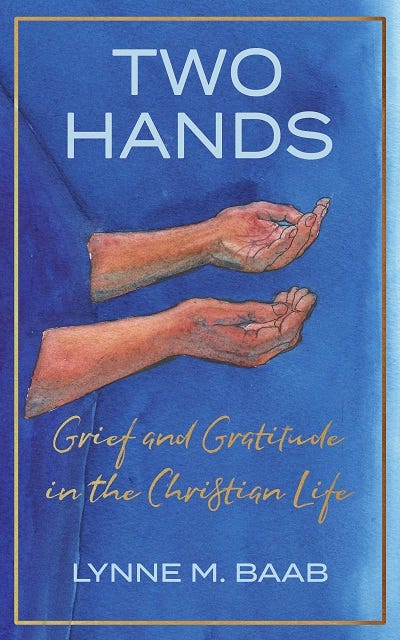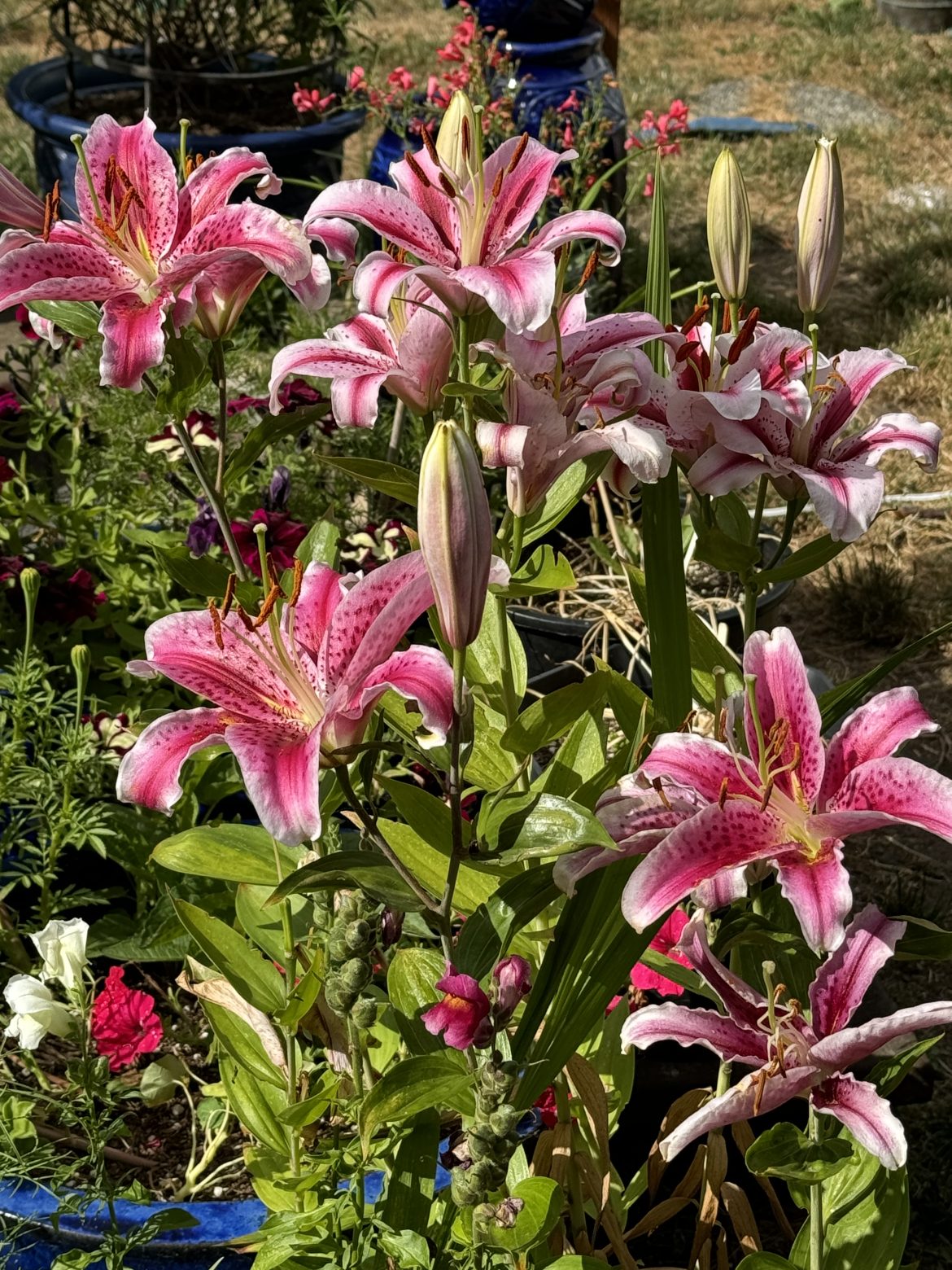I have done a lot of grieving this week. I have also expressed a lot of gratitude as I remembered my brother Nick who meant a lot to me throughout my life. He would have loved this floral display in my garden which I felt I shared with him as I walked around yesterday. Part of what I did over the weekend was revisit this article which I found very helpful both when I wrote it and now as I reread it. Many of us struggle to express our grief and so I thought you would appreciate rereading it too.

When Lynne Baab wrote her book Two Hands: Grief and Gratitude in the Christian Life, it was the first time I considered the important balance between grief and gratitude. It was one of the most impactful books I read in 2021. Part of what it made me realize is that we cannot talk about gratitude without also talking about grief. We cannot talk about grief without allowing gratitude to well up within us. We cannot develop effective rituals for expressing gratitude without creating equally powerful rituals for processing grief.
In her book Lynne gleaned from an equally important article The Geography of Sorrow – Francis Weller on Navigating Our Losses – by Tim McKee, based on an interview with Francis Weller about his book The Wild Edge of Sorrow. Reading both the article and the book resulted in me asking important questions of myself. It is not just about grieving for what we have lost in the pandemic or grieving for our world of violence and ecological disaster. Most of us hold huge wells of unexpressed grief inside us because we live in a culture where grief is unwelcome, something we need to get over quickly. We are ashamed to grieve. As a consequence we are prone to addiction, depression, violence, suicide, possibly cancer, heart disease and I would add PTSD.
The work of the mature person is to carry grief in one hand and gratitude in the other and to be stretched large by them. How much sorrow can I hold? That’s how much gratitude I can give. If I carry only grief, I’ll bend towards cynicism and despair. If I have only gratitude, I’ll become saccharine and won’t develop much compassion for other people’s suffering. Grief keeps the heart fluid and soft, which helps make compassion possible. (The Geography of Sorrow – Francis Weller on Navigating Our Losses – by Tim McKee)
So a few important gems I picked up from the article –
First – We need rituals of grieving and these rituals should be communal. This doesn’t mean we don’t go off and weep in solitude, but after we do we should be welcomed back into a group where we can pour out and empty our sorrows together in an environment of comfort and mutual support. Being with good friends over the weekend, sharing photos and stories about my brother were very therapeutic for me. I also love the rituals using a cup that Lilly Lewin regularly introduces us to. She uses these in the Thinspace Nashville services she conducts each week as well as for her personal practices. Her recent Freerange Friday: God Holds Our Tears provided another important ritual using a pitcher of water that is also very profound. These are the types of practices we all need to help us maintain the grief/gratitude balance.
In healthy cultures one person’s wound is an opportunity for another to bring medicine. But if you are silent about your suffering, then your friends stay spiritually unemployed. In Navajo culture, for example, illness and loss are seen as communal concerns, not as the responsibility of the individual. Healing is a matter of restoring hozho – beauty/harmony in the community. The Geography of Sorrow – Francis Weller on Navigating Our Losses – by Tim McKee
Second – we should approach grief with reverence, engaging it, sitting with it, mulling it over and recognizing it is worthy of our time . I think this is particularly important not just for me at the moment but for all of us who are grieving the violence and destruction in our society. We all came out of the COVID pandemic with a load of grief weighing us down. Since them we confronted the horrors of war in Ukraine and Israel/Palestine, earthquakes in Turkey and Afghanistan and the climate crisis that overwhelms us. We are encouraged to feel we should get over our grief quickly, or pretend there is no grief weighing us down. We are encouraged to get back to normal, maybe go on a shopping spree and enjoy life again. Grief is seen as something to be ashamed of, not something to embrace. It is easy to dismiss the need for rituals of grief especially as the consumer culture hypes up for the Christmas season in the next couple of months. After all isn’t Christmas meant to be “the happiest season of all?”
Here are a few of my suggestions on rituals that can help us process our grief and move towards gratitude in the coming months:
- Sit around the table with your family or a few close friends and talk about those things from the past that still need to be grieved over. I have sat around tables with a cup of tea in the most unlikely circumstances grieving together with friends and family. I still vividly remember when I was in practice in Christchurch New Zealand and and a teenager died of cancer. I sat, with his family as we created a circle around his body and they shared stories about his life. Just talking about these together can bring a measure of healing. I also vividly remember sitting with First Nation’s friend Richard Twiss and a very culturally diverse group in a teepee listening to the grief of rejection many of those present had suffered. Discuss other ways that you could support each other as you process your grief.
- Plan a celebration for All Saints’ Day or Day of the Dead coming up at the beginning of November. Celebrating, grieving and giving thanks for those who have gone before are all interwoven in these important days on the church calendar. I love the ribbons of remembrance that our church creates every year. We all have an opportunity to write the names of our loved ones on ribbons that later are woven around the altar rail or hung around the church.
- Plan a Blue Christmas celebration. Here on Godspace we provide a growing set of resources to help with this celebration. During the COVID lockdown, we participated in a powerful and extremely meaningful online Blue Christmas service where we interwove liturgy, creativity, scripture and music together.
- Plan regular retreat days over the next few months to help you slow down, grieve and find that much needed balance between grief and gratitude. Part of the wonder of the Advent and Christmas story which we are quickly moving towards is the recounting of both joy and tragedy. If you follow the liturgical calendar you know that December 28th is Holy Innocents Day when we commemorate the execution of the innocent, male children in Bethlehem as told in Matthew 2:16. It is an uncomfortable day that I always want to skip over, but this year I know it is worthy of remembering. So many innocents have died in the last year from hunger, disease, violence and natural disasters. This story gives us the foundations for grieving our own losses. It is just as easy for us to skip over the tragedy because of our desire to focus on the joy. This year we need to make space for both.
- Write or read poetry, create a piece of artwork, take a photo that juxtaposes grief and gratitude. This was one of my responses to the horrors going on in Israel/Palestine. I wrote this poem which flowed out of my heart as I look at what is happening and was overcome by grief. It was inspired by Matt 5:43-47 and Colossians 1:18-20 in The Message. As I wrote it I found myself giving thanks for the many places in scripture where grief and gratitude come togetherIs our world broken beyond repair?Will we always meet violenceWith more violence?
Death with death?
Hate with hate?
What happened to love?
What have we done with Jesus,
With the One who holds all things together
And promises to fix,
All the broken and dislocated pieces of the universe.
The One who told us:
Love your enemies
Let them bring out the best in you
Not the worst
Live out your God-created identity,
Live generously and graciously towards others.
Be loving in all circumstances.
God is love.
Christine Sine 2023
- Listen to Leonard Cohen’s incredible song Hallelujah which I listen to regularly to help me process some of my grief burden and help me find the silver linings of gratitude often hidden in its midst.
- Journal about your grief feelings.Read Psalm 130 or similar psalm that begins with grief and ends in praise. Sit in the presence of your feelings of grief and allow God to bring healing. As I did that this week this simple poem grew in my mind. It has grown over the week as I continued to mourn.Nothing can deny the painA loved one’s loss can bring.
Nothing will stem the grief
Of losing one who meant so much.
But memories will always bring
Sparks of joy.
Though they arrive
With grief and longing
We cannot quiet,
They come with smiles
For times of laughter past,
With gratitude for moments shared,
Lodged forever in my heart.
NOTE: As an Amazon Associate I receive a small amount for purchases made through appropriate links above. Proceeds go toward the my work on Substack.

